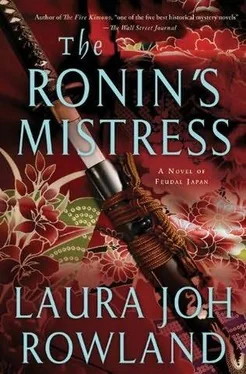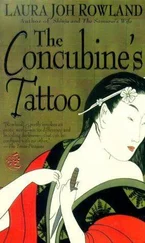Laura Rowland - The Ronin’s Mistress
Здесь есть возможность читать онлайн «Laura Rowland - The Ronin’s Mistress» весь текст электронной книги совершенно бесплатно (целиком полную версию без сокращений). В некоторых случаях можно слушать аудио, скачать через торрент в формате fb2 и присутствует краткое содержание. Жанр: Исторический детектив, на английском языке. Описание произведения, (предисловие) а так же отзывы посетителей доступны на портале библиотеки ЛибКат.
- Название:The Ronin’s Mistress
- Автор:
- Жанр:
- Год:неизвестен
- ISBN:нет данных
- Рейтинг книги:5 / 5. Голосов: 1
-
Избранное:Добавить в избранное
- Отзывы:
-
Ваша оценка:
- 100
- 1
- 2
- 3
- 4
- 5
The Ronin’s Mistress: краткое содержание, описание и аннотация
Предлагаем к чтению аннотацию, описание, краткое содержание или предисловие (зависит от того, что написал сам автор книги «The Ronin’s Mistress»). Если вы не нашли необходимую информацию о книге — напишите в комментариях, мы постараемся отыскать её.
The Ronin’s Mistress — читать онлайн бесплатно полную книгу (весь текст) целиком
Ниже представлен текст книги, разбитый по страницам. Система сохранения места последней прочитанной страницы, позволяет с удобством читать онлайн бесплатно книгу «The Ronin’s Mistress», без необходимости каждый раз заново искать на чём Вы остановились. Поставьте закладку, и сможете в любой момент перейти на страницу, на которой закончили чтение.
Интервал:
Закладка:
They would destroy anyone who opposed them, Hirata understood; and they had the power to stand against all outsiders. But if Hirata were inside their society, he would learn how they divined what actions to take. He would have a say in what they did. Somebody had to control them, and who better than he? Furthermore, he must protect Sano, the shogun, the regime, his family, and all of Japan from these dangerous men.
These noble goals fit with a motive that was more personal. If Hirata joined the society, he would gain access to the rituals, spells, and secrets that would raise his mystical martial arts expertise to a new level. He wanted this with a fierce longing that overpowered his reservations.
“Well, then,” Hirata said. His excitement and his eagerness to be initiated into the secrets of the cosmos warred with his dread that this was a decision he would live to regret. “I’m in.”
* * *
Noisy crowds streamed in and out through the arched gate of Sengaku Temple. Sano and his troops escorted Reiko in her palanquin through a new marketplace where booths sold noodles, dumplings, rice cakes, dried fruit, sake, and dishware. Peddlers hawked candles, prayers written on wooden stakes and paper strips, and incense. When Sano dismounted, a tout from a theater pressed a playbill into his hand. Such heavy clouds of incense smoke hung over the temple buildings that it looked as if they were on fire.
“I didn’t know there was a festival today,” Reiko said, climbing out of her palanquin. She was bright-eyed and gay, relieved because Sano had told her the good news that she’d won the shogun’s favor by killing Kajikawa, and that the shogun had demoted Yanagisawa and promoted Sano.
“There isn’t a festival,” Sano said. He was happy because Reiko had told him the news about Masahiro’s betrothal. “This is in honor of the forty-seven ronin. ”
Inside the temple precincts, Sano and Reiko squeezed past peasants, merchants, beggars, and squadrons of samurai. Pilgrims, who carried walking sticks and banners from their home villages, besieged the worship hall. Around the well where Oishi and his men had washed Kira’s head, prayer stakes were stuck in the earth amid layers of coins. Sano and Reiko joined a long line outside the cemetery. When they finally got through the gate, the small graveyard was so jammed that they could hardly move. Smoke from incense vats formed a sweet, pungent, suffocating atmosphere. Where Oishi and his men had once stood, bloodstained and awaiting orders, now there were stone tablets that marked their graves.
Lord Asano, in his tomb, was no longer alone. His loyal retainers had come to join him. His disgrace had been obliterated by acclaim for them. Visitors bowed to the grave tablets; they stroked the stone lantern at which the forty-seven ronin had laid Kira’s head; they tied paper prayer strips to the stone fences, where thousands of strips already fluttered. They left offerings on the bases of the tablets, which were already covered with rice cakes, cups of sake, and cherry blossoms. Adulation swelled the voices that murmured in awe, chanted prayers. Samurai wept.
Reiko was crying, too. “They’re heroes,” she said.
“Yes,” Sano said. The public had settled the issue. “Even though they broke the law.” Or perhaps because they’d broken the law. The public loved renegades. “Even though they had to die.” Had they not died, opinion would have still been divided about them. They would have been excoriated, persecuted; and as ronin, they would have worn the mantle of disgrace even though they’d avenged their master. Death shielded them from censure. But in spite of his cynical thoughts, Sano felt tears sting his own eyes. It was impossible not to be moved by the spectacle of such reverence for the highest acts of loyalty and atonement that a samurai could perform. Even though he was uneasy about his own role in the business.
He looked at the playbill in his hand. Its heading read, The Forty-Seven Loyal Retainers ; it was illustrated by a crude drawing of samurai in battle and listed a cast of famous actors. Oishi and his men had caught the fancy of the theater world. They were famous, on their way to becoming immortalized.
“Where is Oishi’s grave?” Reiko asked.
They found it in a corner of the cemetery. It was a stone tablet flanked by vases of flowers and enclosed on three sides by a wooden cage. As Sano and Reiko paid their silent respects to Oishi, a fashionably dressed man elbowed through the crowd.
“Forgive me, Oishi- san, ” he cried, prostrating himself before the grave. He had a square face with an aggressive jaw. “When I saw you lying in the gutter in Miyako, I thought you’d become a worthless bum. But now I know I misjudged you. You were a true samurai.”
Sano stared, amazed. “That’s the man from Satsuma,” he told Reiko. “The one Oishi mentioned in his story.”
They took the long route back to their escorts, around the temple, skirting the woods. It was quiet and peaceful here, and lush with spring, but Sano’s thoughts were dark, troubled.
“What’s wrong?” Reiko asked.
“I feel as if I don’t deserve the promotion,” Sano said.
“Why on earth not?”
Sano hadn’t told Reiko about the moment when he’d been presented with the choice between rescuing the shogun or Masahiro. In all the confusion no one but himself had noticed it. He told Reiko now.
“If Hirata and the soldiers hadn’t helped the shogun, you’d have done it and let Yanagisawa kill Masahiro?” Reiko’s voice was filled with horrified indignation. Then she looked stunned as the opposite scenario occurred to her. “You would have saved Masahiro and abandoned the shogun?” She sucked in her breath, then released it in a whisper. “Oh.”
It was clear that she recognized the dilemma that Sano had experienced and saw that whichever his choice, the consequences would have been disastrous. She waved her hand, as if to fend off the very idea of them. “But you didn’t choose. You didn’t have to, thank the gods. So let’s not even think about it.”
“I can’t help thinking about it,” Sano said. “I keep wondering whom I’d have chosen. Could I put Bushido and loyalty to my lord ahead of Masahiro’s life? Or would I have made the same choice as Kajikawa, who put his feelings for his son above all other concerns?” Sano glanced toward the temple. “When I looked at Oishi’s grave, I felt inferior.”
Reiko was silent for a long moment. Sano could tell that she thought he should have saved their son and the shogun be damned. She was Masahiro’s mother. Her maternal instinct outweighed Bushido.
When she spoke, she picked her words carefully, as if trying to assuage Sano’s doubt about his worth as a samurai while stifling her urge to impose her own opinion on him. “In the end, I think actions matter more than motives. The forty-seven ronin avenged their master’s death. History will remember them for their loyalty, not everything else. The same applies to you.” She gently touched Sano’s arm. “The shogun thinks you protected him from Kajikawa. It’s true. But he’s forgotten that you’ve risked your life for him many times.” She smiled, tender and proud. “You’re every bit as much a samurai hero as the forty-seven ronin. ”
Her praise lifted Sano’s spirits. “I suppose I have to believe you, because you’re always right,” he said.
It felt good to be out of disgrace and officially back at the helm of the regime. Sano decided to stop dwelling on what he might have done under different circumstances. Instead, he would renew his commitment to Bushido and do his loyal best to serve the shogun. He would turn his attention to the future.
Читать дальшеИнтервал:
Закладка:
Похожие книги на «The Ronin’s Mistress»
Представляем Вашему вниманию похожие книги на «The Ronin’s Mistress» списком для выбора. Мы отобрали схожую по названию и смыслу литературу в надежде предоставить читателям больше вариантов отыскать новые, интересные, ещё непрочитанные произведения.
Обсуждение, отзывы о книге «The Ronin’s Mistress» и просто собственные мнения читателей. Оставьте ваши комментарии, напишите, что Вы думаете о произведении, его смысле или главных героях. Укажите что конкретно понравилось, а что нет, и почему Вы так считаете.












